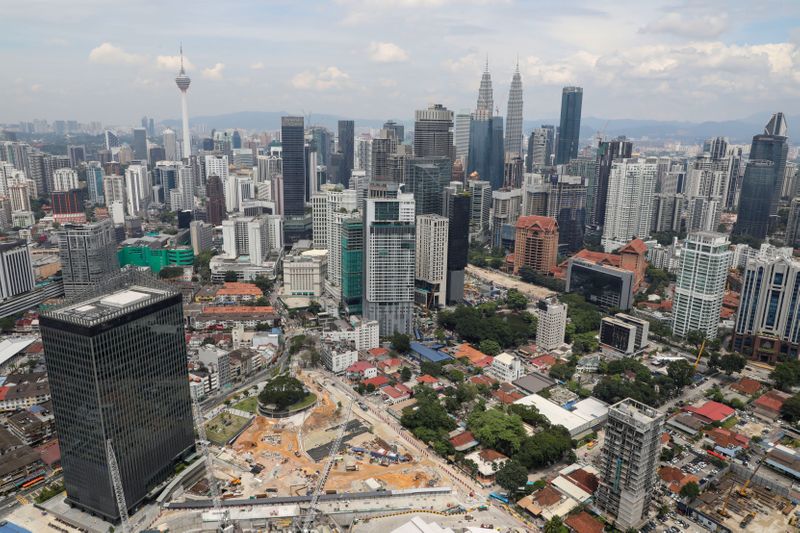By Joseph Sipalan
KUALA LUMPUR (Reuters) - Malaysia's economy grew marginally in the first quarter, execeeding expectations, but will likely contract in April-June as the coronavirus pandemic hits exports and domestic demand.
Gross domestic product grew 0.7% in the first quarter from a year earlier, better than the 1.5% decline forecast in a Reuters poll, though still below the 3.6% growth rate in the fourth quarter.
Bank Negara Malaysia said the coronavirus outbreak had affected growth across major and regional economies, many of which imposed lockdowns that crimped economic activity and demand, including in Malaysia.
"The ongoing pandemic has created an unprecedented economic crisis," central bank Governor Nor Shamsiah Mohd Yunus told a virtual media conference.
Curbs on movement and businesses, which were imposed in mid-March to contain the spread of the virus and extended to June 9, will likely cause a decline in the economy this quarter before economic activity gradually improves in the second half of the year, the central bank said.
Southeast Asia's third-largest economy has taken a blow from sharp downturns in tourism and a drop in demand for its commodities such as palm oil, crude oil and natural gas.
The economy continued to be propped up by private consumption, which grew 6.7% annually in the first quarter, but it may take a hit moving forward as BNM expects the pandemic to have a significant effect on the labour market.
Unemployment rose to 3.5% in January-March due to six weeks of strict social restrictions, from 3.2% the previous quarter, according to department of statistics data.
EXPORTS UNDER PRESSURE
Exports fell 4.7% in March when the curbs were introduced, sharply down from the 11.8% expansion from a month earlier.
This indicates that the government needs to speed up large-scale infrastructure projects and reopen the economy to mitigate the effects of weak external demand, said Bank Islam chief economist Mohd Afzanizam Abdul Rashid.
"Assuming that COVID-19 infection rates remain under control, the government needs to accelerate infrastructure project implementation in order to kickstart the economy," Mohd Afzanizam told Reuters.
"However, they need to be mindful of the possible resurgence of new cases. It's a tough balancing act."
Malaysia, which until mid-April had the highest number of reported coronavirus cases in Southeast Asia, has since relaxed some of the restrictions in a bid to jumpstart the economy.
BNM took aggressive preemptive moves earlier this year, slashing its overnight policy rate
Nor Shamsiah said the rate cuts would help reduce the debt burden of households and businesses and aid expansion going into the second half.
Any additional cuts this year will be based on prevailing economic and monetary conditions, she said.
Nor Shamsiah said the central bank was unable to provide a forecast for full-year 2020 growth due to the uncertainties tied to the pandemic.
The central bank in a statement predicted the economy would contract in the second quarter but economic activity was expected to gradually improve in the second half.
The central bank had in April forecast the economy to either shrink by as much as 2% or grow marginally by 0.5% this year.
Factory output also took a hit in March when it contracted 4.9%, its sharpest decline in nearly a decade.

BNM said average headline inflation will likely turn negative this year on substantially lower global oil prices. Consumer prices in March fell for the first time in more than a year, easing 0.2% due to cheaper pump prices.